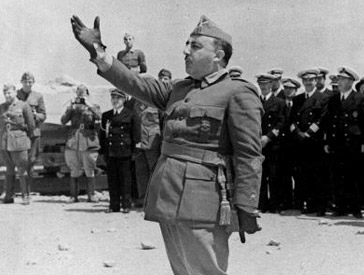Why are Francisco Franco’s remains being exhumed?
Court in Spain rules that dictator's body should be moved to less controversial site

A free daily email with the biggest news stories of the day – and the best features from TheWeek.com
You are now subscribed
Your newsletter sign-up was successful
The Supreme Court in Spain has ruled that the remains of Francisco Franco should be exhumed and moved to a new location.
In a unanimous verdict, the judges backed the government's plan to move the remains of the dictator from a state mausoleum to a less contentious site. The court rejected an appeal from Franco's relatives against the exhumation.
Franco won the 1930s civil war with the help of Nazi Germany and Mussolini's Italy. He went on to rule Spain until 1975. The BBC says the general “fought a brutal war against democracy... and thereafter presided over a regime of state terror and national brainwashing through the controlled media and the state education system”.
The Week
Escape your echo chamber. Get the facts behind the news, plus analysis from multiple perspectives.

Sign up for The Week's Free Newsletters
From our morning news briefing to a weekly Good News Newsletter, get the best of The Week delivered directly to your inbox.
From our morning news briefing to a weekly Good News Newsletter, get the best of The Week delivered directly to your inbox.
Franco’s remains are currently in a vast mausoleum just outside Madrid called the Valley of the Fallen. The site has divided opinion in Spain. Many feel it is a monument to fascism.
In August, the government backed plans to move Franco’s remains next to those of his wife in El Pardo cemetery north of Madrid, where other politicians rest.
Agreeing with the government, the court said it had decided to “completely reject the appeal lodged by the family in relation to Francisco Franco's exhumation”.
Taking to Twitter, Prime Minister Pedro Sanchez welcomed the verdict as a "great victory for democracy".
A free daily email with the biggest news stories of the day – and the best features from TheWeek.com
The BBC’s Guy Hedgecoe said that the verdict could be a boost to the government at a crucial time. “If Franco's remains are moved by 10 November it would give the Socialists a boost in the general election to be held that day,” he wrote.
Franco’s relatives cannot appeal the decision, but their lawyer, Luis Felipe Utrera, told Spanish public broadcaster TVE that they plan to take the battle “to the end” by going to the country's constitutional court and the European Court of Human Rights.
–––––––––––––––––––––––––––––––For a round-up of the most important stories from around the world - and a concise, refreshing and balanced take on the week’s news agenda - try The Week magazine. Get your first six issues for £6–––––––––––––––––––––––––––––––
-
 One great cookbook: Joshua McFadden’s ‘Six Seasons of Pasta’
One great cookbook: Joshua McFadden’s ‘Six Seasons of Pasta’the week recommends The pasta you know and love. But ever so much better.
-
 Scientists are worried about amoebas
Scientists are worried about amoebasUnder the radar Small and very mighty
-
 Buddhist monks’ US walk for peace
Buddhist monks’ US walk for peaceUnder the Radar Crowds have turned out on the roads from California to Washington and ‘millions are finding hope in their journey’
-
 Epstein files topple law CEO, roil UK government
Epstein files topple law CEO, roil UK governmentSpeed Read Peter Mandelson, Britain’s former ambassador to the US, is caught up in the scandal
-
 Iran and US prepare to meet after skirmishes
Iran and US prepare to meet after skirmishesSpeed Read The incident comes amid heightened tensions in the Middle East
-
 Israel retrieves final hostage’s body from Gaza
Israel retrieves final hostage’s body from GazaSpeed Read The 24-year-old police officer was killed during the initial Hamas attack
-
 China’s Xi targets top general in growing purge
China’s Xi targets top general in growing purgeSpeed Read Zhang Youxia is being investigated over ‘grave violations’ of the law
-
 Panama and Canada are negotiating over a crucial copper mine
Panama and Canada are negotiating over a crucial copper mineIn the Spotlight Panama is set to make a final decision on the mine this summer
-
 Why Greenland’s natural resources are nearly impossible to mine
Why Greenland’s natural resources are nearly impossible to mineThe Explainer The country’s natural landscape makes the task extremely difficult
-
 Iran cuts internet as protests escalate
Iran cuts internet as protests escalateSpeed Reada Government buildings across the country have been set on fire
-
 US nabs ‘shadow’ tanker claimed by Russia
US nabs ‘shadow’ tanker claimed by RussiaSpeed Read The ship was one of two vessels seized by the US military